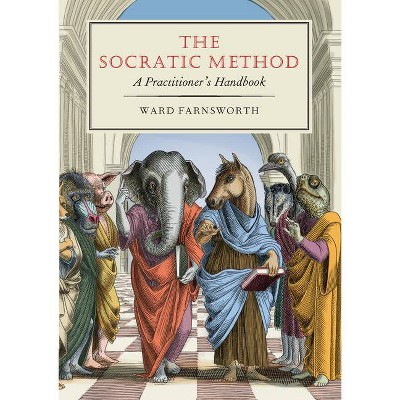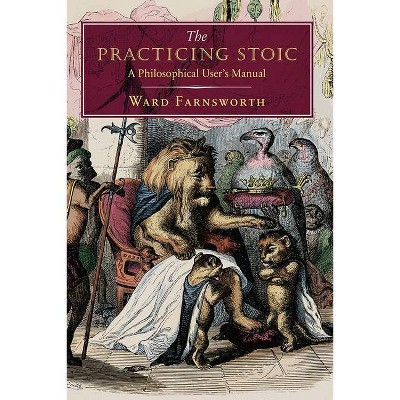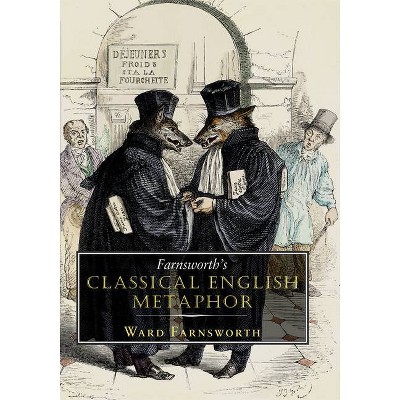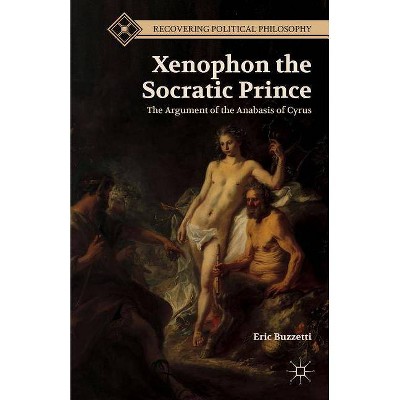The Socratic Method - by Ward Farnsworth (Hardcover)

Similar Products
Products of same category from the store
AllProduct info
<p/><br></br><p><b> About the Book </b></p></br></br>"The Socratic method is one of the timeless inventions of the ancient world. It is a path to wisdom and a way to think more intelligently about questions large or small. It is a technique for teaching others and for talking to yourself. It is an antidote to stupidity, to irrationality, and to social media. It is easy to understand but challenging to master. It is useful for everyone. This book explains the Socratic method in detail: what it is, where it came from, and how to carry it out. The chapters teach the elements of the method step by step with examples from Plato's dialogues. They illustrate how to create Socratic questions of your own. They show how the teachings of Socrates produced the philosophies of Stoicism and Skepticism. The book also explains how the Socratic method can be put to work in the classroom, and it offers Socratic rules of engagement for talking about politics and other hard things. The Socratic Method is a complete guide to the practical use of a great idea"--<p/><br></br><p><b> Book Synopsis </b></p></br></br><p><b>A thinking person's guide to a better life. Ward Farnsworth explains what the Socratic method is, how it works, and why it matters more than ever in our time. Easy to grasp yet challenging to master, the method will change the way you think about life's big questions. "A wonderful book."--Rebecca Goldstein, author of <i>Plato at the Googleplex</i>.</b> <p/> About 2,500 years ago, Plato wrote a set of dialogues that depict Socrates in conversation. The way Socrates asks questions, and the reasons why, amount to a whole way of thinking. This is the Socratic method--one of humanity's great achievements. More than a technique, the method is an ethic of patience, inquiry, humility, and doubt. It is an aid to better thinking, and a remedy for bad habits of mind, whether in law, politics, the classroom, or tackling life's big questions at the kitchen table. <p/> Drawing on hundreds of quotations, this book explains what the Socratic method is and how to use it. Chapters include <i>Socratic Ethics</i>, <i>Ignorance</i>, <i>Testing Principles</i>, and <i>Socrates and the Stoics</i>. Socratic philosophy is still startling after all these years because it is an approach to asking hard questions and chasing after them. It is a route to wisdom and a way of thinking about wisdom. With Farnsworth as your guide, the ideas of Socrates are easier to understand than ever and accessible to anyone. <p/>As Farnsworth achieved with <i>The Practicing Stoic</i> and the <i>Farnsworth's Classical English</i> series, ideas of old are made new and vital again. This book is for those coming to philosophy the way Socrates did--as the everyday activity of making sense out of life and how to live it--and for anyone who wants to know what he said about doing that better.</p><p/><br></br><p><b> Review Quotes </b></p></br></br><br><p><b>Praise for <i>The Socratic Method</i></b> <p/> "A wonderful book. It is elegant, erudite, but wears its pedagogical virtues so lightly as to never come off as pedantic."<br><b>--Rebecca Goldstein, author of <i>Plato at the Googleplex</i></b> <p/>"A group of bad American movies has unfortunately associated the Socratic method of inquiry and teaching with a bullying style of teaching. But the Socratic method was something very different to Socrates, and is something that remains at the heart of serious intellectual honesty. Ward Farnsworth's important book is not only impressively erudite in its mining of classical sources, but is also the best account we have of what the Socratic method really is and why we dismiss or caricature it at our peril."<br><b>-- Frederick Schauer, David and Mary Harrison Distinguished Professor of Law, University of Virginia</b> <p/> "Many of us refer casually to the Socratic method and some of us think we practice it. But is only when reading Ward Farnsworth's learned and inspiring book that one can begin to appreciate the profundity of Plato's teaching and understand how its lessons are just what is needed in a world where invective and hasty judgments seem to have replaced deliberative reasoning and rational argument."<br><b>--Stanley Fish, author of <i>Winning Arguments</i></b> <p/>"A great success. There is nothing like it. An excellent resource both for students and for general readers."<br>--<b>A. A. Long, author of <i>Epictetus: A Stoic and Socratic Guide to Life</i></b> <p/>"A beautifully written, immensely thoughtful, and multi-faceted book. Ward Farnsworth offers a fresh understanding of the Socratic method as it's represented in Plato's early dialogs, then shows how it can be internalized as a way of bettering intelligence."<br><b>--Henry Abelove, Professor Emeritus of English, Wesleyan University</b> <p/> "Ward Farnsworth's <i>The Socratic Method</i> deserves attention from scholars and lawyers and teachers of law--but, really, from anyone who wants to practice clear thinking. The book rests on a firm foundation of scholarship and then goes on to do something at which few such scholarly works succeed: it is useful for ordinary readers. It is indeed a practitioner's handbook. Read it to enlarge your knowledge of ancient thought, but also read it for the mental exercises all thinkers need in order to stay agile."<br><b>--Paul Woodruff, author of <i>The Garden of Leaders: Revolutionizing Higher Education</i></b> <p/>"Ward Farnsworth's brilliant new book, <i>The Socratic Method</i>, offers powerful insights into the most important and effective means for discovering the truth, or at least coming closer to it, in education, politics, business, and everyday relations. Building on the wisdom of Socrates, Farnsworth makes clear not only why Socratic discourse is essential, but also how to undertake such discourse in a positive and affirming manner. This is especially important today at a time of deep political polarization in which Americans increasingly speak only to people like themselves and hold those who disagree with them in disdain. This state of affairs, no doubt contributed to by the advent of social media, poses a serious threat to a well-functioning democracy. If we as a nation are to make it through these times and preserve the most fundamental premises of our democracy, we must all learn how to engage in Socratic discourse and embrace the principles of an open mind, rigorous questioning and honest debate. This book offers essential lessons to anyone seeking to preserve American democracy."<br><b>--Geoffrey R. Stone, Edward H. Levi Distinguished Professor of Law, The University of Chicago</p><br><br><p><b>Praise for Ward Farnsworth</b>: <p/><b><i>The Practicing Stoic: A Philosophical User's Manual</b></i>: <p/>"As befits a good Stoic, Farnsworth's expository prose exhibits both clarity and an unflappable calm... Throughout <i>The Practicing Stoic</i>, Farnsworth beautifully integrates his own observations with scores of quotations from Epictetus, Seneca, Marcus Aurelius, Montaigne and others. As a result, this isn't just a book to read--it's a book to return to, a book that will provide perspective and consolation at times of heartbreak or calamity."-- Michael Dirda, <i>The Washington Post</i> <p/>"It is reported that upon Seneca's tomb are written the words, <i>Who's Minding the Stoa?</i> He would be pleased to know the answer is <i>Ward Farnsworth.</i>"--David Mamet <p/>"This is a book any thoughtful person will be glad to have along as a companion for an extended weekend or, indeed, for that protracted journey we call life."--<i>The New Criterion</i> <p/>"This sturdy and engaging introductory text consists mostly of excerpts from the ancient Greek and Roman Stoic philosophers, especially Seneca, Epictetus through his student Arrian, and Marcus Aurelius as well as that trio's philosophical confreres, from the earlier Hellenic Stoics and Cicero to such contemporaries as Plutarch to moderns, including Montaigne, Adam Smith, and Schopenhauer... A philosophy to live by, Stoicism may remind many of Buddhism and Quakerism, for it asks of practitioners something very similar to what those disciplines call mindfulness."--<i>Booklist</i> <p/><b><i>Farnsworth's Classical English Style</i></b>: <p/>"Mr. Farnsworth has written an original and absorbing guide to English style. Get it if you can."--<i>Wall Street Journal</i> <p/>"For writers aspiring to master the craft, Farnsworth shows how it's done. For lovers of language, he provides waves of sheer pleasure."--Steven Pinker <p/>"An eloquent study of the very mechanisms of eloquence."--Henry Hitchings <p/>"A great and edifying pleasure."--Mark Helprin <p/>"A storehouse of effective writing, showing the techniques you may freely adapt to make music of your own." --<i>The Baltimore Sun</i></b> <p/><b><i>Farnsworth's Classical English Rhetoric</b></i>: <p/>"I must refrain from shouting what a brilliant work this is <i>(præteritio)</i>. Farnsworth has written the book as he ought to have written it - and as only he could have written it <i>(symploce)</i>. Buy it and read it - buy it and read it <i>(epimone)</i>."--Bryan A. Garner, <i>Garner's Modern English Usage</i> <p/>"The most immediate pleasure of this book is that it heightens one's appreciation of the craft of great writers and speakers. Mr. Farnsworth includes numerous examples from Shakespeare and Dickens, Thoreau and Emerson, Winston Churchill and Abraham Lincoln. He also seems keen to rehabilitate writers and speakers whose rhetorical artistry is undervalued; besides his liking for Chesterton, he shows deep admiration for the Irish statesman Henry Grattan (1746-1820), whose studied repetition of a word ('No lawyer can say so; because no lawyer could say so without forfeiting his character as a lawyer') is an instance, we are told, of <i>conduplicatio</i>. But more than anything Mr. Farnsworth wants to restore the reputation of rhetorical artistry per se, and the result is a handsome work of reference."--Henry Hitchings, <i>Wall Street Journal</i> <p/><b><i>Farnsworth's Classical English Metaphor</b></i>: <p/>"Ward Farnsworth is a witty commentator...It's a book to dip in and savor."--<i>The Boston Globe</i> <p/>"Most people will find it a grab-bag of memorable quotations, an ideal browsing book for the nightstand."--Michael Dirda, <i>The Washington Post</i> <p/>"I want this book to be beside my bed for years to come, a treasure-house of the liquid magic of words."--Simon Winchester <p/>"A feat of elegant demystification...Farnsworth is able to focus on the finite material of metaphorical referents...a brilliant strategy, both in its utility for writers and the inherent insight Farnsworth's divisions suggest about metaphors."--Jonathan Russell Clark, <i>The Millions</i></p><br>
Price History
Cheapest price in the interval: 25.49 on October 27, 2021
Most expensive price in the interval: 25.49 on November 8, 2021
Price Archive shows prices from various stores, lets you see history and find the cheapest. There is no actual sale on the website. For all support, inquiry and suggestion messages communication@pricearchive.us




















